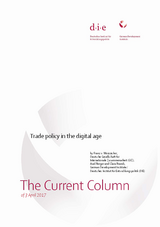Trade policy in the digital age
von Weizsäcker, Franz / Axel Berger / Clara BrandiThe Current Column (2017)
Bonn: German Development Institute / Deutsches Institut für Entwicklungspolitik (DIE) (The Current Column of 3 April 2017)
Bonn, 3 April 2017. In view of the executive orders US-President Trump signed this weekend, , the risk of an escalation in protectionist measures, or even new trade wars, is more pervasive than ever. This would have fatal consequences, not least for the weaker members of society and the poorer countries of the world. These rely particularly on international trade having a basis in rules rather than power. At its latest meeting in Baden-Baden in March the G20 failed to achieve a common commitment to countering protectionism – usually a central pillar of the joint G20 position. Open world trade is under increasing pressure. However, making globalisation the scapegoat for the fears of employees, consumers and domestic companies will not address the challenges currently facing us. In the age of social media people's attention is gained via simple messages in tweets of 140 characters. Populists use this to stoke mistrust and fear. The entry of Trump to the White House rendered aggressive mercantilism acceptable in Washington, calling into question the foundations of the trade system. At the same time, many people perceive trade policy as too complex and opaque. The protests against the Transatlantic Trade and Investment Partnership in Germany were an indication that reforming global trade can no longer be undertaken over the heads of citizens. The protests were directed not only towards the content of the negotiations, but also against the manner in which these were conducted. Trade policy 4.0 The question is this: how can the framework of trade policy be radically reconceived in a way that meets current challenges? How can globalisation be made more participative and inclusive and the trust of citizens regained? The required trade policy reform also needs to focus on the technological paradigm shift of the present and future. Whilst digitalisation has become a matter of course for global companies and customs authorities, the framework of trade policy remains stuck in the 20th century. Much potential goes untapped. We should seize the opportunity to initiate a discussion about the possible form of a new trade policy 4.0. Firstly, trade policy needs to become more transparent and tangible for business, academia and citizens. The availability of data is key here, and visualisation and public communication can render complex issues comprehensible. For example, new technology forms already enable a consumer scanning his product with a smartphone to examine the entire global chain of production, customs as well as social and environmental standards. Secondly, trade policy should become more participative. Instead of negotiations between governments, held behind closed doors over a period of several years, governments could use the new technology to elicit the interests and concerns of citizens prior to negotiations, in a form of "crowd sourcing". During the negotiations themselves increased use could be made of social media to inform people of the progress of the negotiations. And when forecasting and examining the effects of the treaty the new technology could be used to obtain the assessments of the groups concerned, instead of relying solely on statistical estimates. Thirdly, digital trade can boost small and medium-sized companies. As in the vision of Jack Ma, founder of internet giant Alibaba, the creation of a new "Electronic World Trade Platform" could prove a good supplement to the WTO. The idea is for companies, supported by governments, to establish joint e-commerce hubs, which would in turn enable small and medium-sized enterprises to sell their goods and services across borders, with low or no import duties, speedy customs clearance and efficient logistics. A fourth step would be the use of blockchains. The forgery-proof accounting of blockchain technology can record data on products and their production worldwide, offering not only reliable traceability and consumer information as a consequence. A detailed data situation regarding individual products may one day form the centrepiece of a new type of governance in world trade. In this way the production processes throughout the entire value chain could flow into trade policy if the World Trade Organization were to allow more scope for this, for example with a view to the carbon footprint of products. Many open questions still remain with regard to the trade policy of the digital future. A first step on this path lies in identifying and using the opportunities of the new technology, which enable a rethink of trade policy. We believe that bold steps are required to re-establish the legitimacy of the global trading system and make it more transparent and participative.



